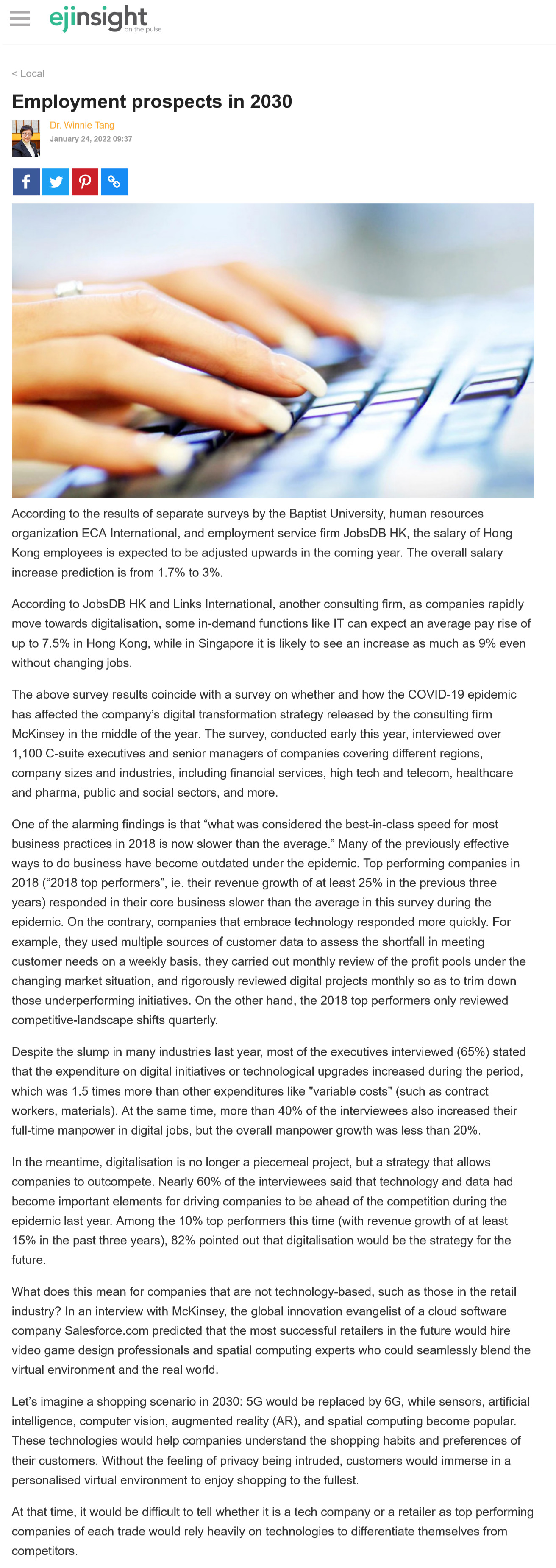網上版請按此

Employment prospects in 2030
According to the results of separate surveys by the Baptist University, human resources organization ECA International, and employment service firm JobsDB HK, the salary of Hong Kong employees is expected to be adjusted upwards in the coming year. The overall salary increase prediction is from 1.7% to 3%.
According to JobsDB HK and Links International, another consulting firm, as companies rapidly move towards digitalisation, some in-demand functions like IT can expect an average pay rise of up to 7.5% in Hong Kong, while in Singapore it is likely to see an increase as much as 9% even without changing jobs.
The above survey results coincide with a survey on whether and how the COVID-19 epidemic has affected the company's digital transformation strategy released by the consulting firm McKinsey in the middle of the year. The survey, conducted early this year, interviewed over 1,100 C-suite executives and senior managers of companies covering different regions, company sizes and industries, including financial services, high tech and telecom, healthcare and pharma, public and social sectors, and more.
One of the alarming findings is that "what was considered the best-in-class speed for most business practices in 2018 is now slower than the average." Many of the previously effective ways to do business have become outdated under the epidemic. Top performing companies in 2018 ("2018 top performers", ie. their revenue growth of at least 25% in the previous three years) responded in their core business slower than the average in this survey during the epidemic. On the contrary, companies that embrace technology responded more quickly. For example, they used multiple sources of customer data to assess the shortfall in meeting customer needs on a weekly basis, they carried out monthly review of the profit pools under the changing market situation, and rigorously reviewed digital projects monthly so as to trim down those underperforming initiatives. On the other hand, the 2018 top performers only reviewed competitive-landscape shifts quarterly.
Despite the slump in many industries last year, most of the executives interviewed (65%) stated that the expenditure on digital initiatives or technological upgrades increased during the period, which was 1.5 times more than other expenditures like "variable costs" (such as contract workers, materials). At the same time, more than 40% of the interviewees also increased their full-time manpower in digital jobs, but the overall manpower growth was less than 20%.
In the meantime, digitalisation is no longer a piecemeal project, but a strategy that allows companies to outcompete. Nearly 60% of the interviewees said that technology and data had become important elements for driving companies to be ahead of the competition during the epidemic last year. Among the 10% top performers this time (with revenue growth of at least 15% in the past three years), 82% pointed out that digitalisation would be the strategy for the future.
What does this mean for companies that are not technology-based, such as those in the retail industry? In an interview with McKinsey, the global innovation evangelist of a cloud software company Salesforce.com predicted that the most successful retailers in the future would hire video game design professionals and spatial computing experts who could seamlessly blend the virtual environment and the real world.
Let's imagine a shopping scenario in 2030: 5G would be replaced by 6G, while sensors, artificial intelligence, computer vision, augmented reality (AR), and spatial computing become popular. These technologies would help companies understand the shopping habits and preferences of their customers. Without the feeling of privacy being intruded, customers would immerse in a personalised virtual environment to enjoy shopping to the fullest.
At that time, it would be difficult to tell whether it is a tech company or a retailer as top performing companies of each trade would rely heavily on technologies to differentiate themselves from competitors.
Dr. Winnie Tang
Adjunct Professor, Department of Computer Science, Faculty of Engineering; Department of Geography, Faculty of Social Sciences; and Faculty of Architecture, The University of Hong Kong